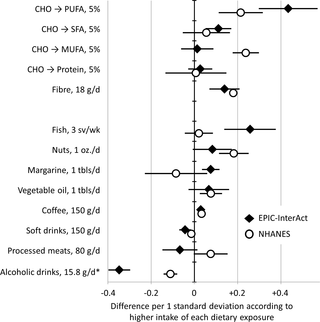PLOS Medicine ( IF 10.5 ) Pub Date : 2017-10-11 , DOI: 10.1371/journal.pmed.1002409 Fumiaki Imamura 1 , Stephen J Sharp 1 , Albert Koulman 2, 3, 4 , Matthias B Schulze 5 , Janine Kröger 5 , Julian L Griffin 4, 6 , José M Huerta 7, 8 , Marcela Guevara 8, 9 , Ivonne Sluijs 10 , Antonio Agudo 11 , Eva Ardanaz 8, 9 , Beverley Balkau 12 , Heiner Boeing 5 , Veronique Chajes 13 , Christina C Dahm 14 , Courtney Dow 12, 15 , Guy Fagherazzi 12, 15 , Edith J M Feskens 16 , Paul W Franks 17, 18 , Diana Gavrila 8, 19, 20 , Marc Gunter 14 , Rudolf Kaaks 21 , Timothy J Key 22 , Kay-Tee Khaw 23 , Tilman Kühn 21 , Olle Melander 18 , Elena Molina-Portillo 8, 24 , Peter M Nilsson 23 , Anja Olsen 25 , Kim Overvad 14, 26 , Domenico Palli 27 , Salvatore Panico 28 , Olov Rolandsson 17 , Sabina Sieri 29 , Carlotta Sacerdote 30 , Nadia Slimani 13 , Annemieke M W Spijkerman 31 , Anne Tjønneland 25 , Rosario Tumino 32 , Yvonne T van der Schouw 10 , Claudia Langenberg 1 , Elio Riboli 33 , Nita G Forouhi 1 , Nick J Wareham 1

|
Background
Combinations of multiple fatty acids may influence cardiometabolic risk more than single fatty acids. The association of a combination of fatty acids with incident type 2 diabetes (T2D) has not been evaluated.
Methods and findings
We measured plasma phospholipid fatty acids by gas chromatography in 27,296 adults, including 12,132 incident cases of T2D, over the follow-up period between baseline (1991–1998) and 31 December 2007 in 8 European countries in EPIC-InterAct, a nested case-cohort study. The first principal component derived by principal component analysis of 27 individual fatty acids (mole percentage) was the main exposure (subsequently called the fatty acid pattern score [FA-pattern score]). The FA-pattern score was partly characterised by high concentrations of linoleic acid, stearic acid, odd-chain fatty acids, and very-long-chain saturated fatty acids and low concentrations of γ-linolenic acid, palmitic acid, and long-chain monounsaturated fatty acids, and it explained 16.1% of the overall variability of the 27 fatty acids. Based on country-specific Prentice-weighted Cox regression and random-effects meta-analysis, the FA-pattern score was associated with lower incident T2D. Comparing the top to the bottom fifth of the score, the hazard ratio of incident T2D was 0.23 (95% CI 0.19–0.29) adjusted for potential confounders and 0.37 (95% CI 0.27–0.50) further adjusted for metabolic risk factors. The association changed little after adjustment for individual fatty acids or fatty acid subclasses. In cross-sectional analyses relating the FA-pattern score to metabolic, genetic, and dietary factors, the FA-pattern score was inversely associated with adiposity, triglycerides, liver enzymes, C-reactive protein, a genetic score representing insulin resistance, and dietary intakes of soft drinks and alcohol and was positively associated with high-density-lipoprotein cholesterol and intakes of polyunsaturated fat, dietary fibre, and coffee (p < 0.05 each). Limitations include potential measurement error in the fatty acids and other model covariates and possible residual confounding.
Conclusions
A combination of individual fatty acids, characterised by high concentrations of linoleic acid, odd-chain fatty acids, and very long-chain fatty acids, was associated with lower incidence of T2D. The specific fatty acid pattern may be influenced by metabolic, genetic, and dietary factors.
中文翻译:

血浆磷脂脂肪酸的组合及其与 2 型糖尿病发病率的关系:EPIC-InterAct 病例队列研究
背景
多种脂肪酸的组合可能比单一脂肪酸对心脏代谢风险的影响更大。脂肪酸组合与 2 型糖尿病 (T2D) 事件之间的关联尚未得到评估。
方法和结果
我们在基线(1991-1998)至 2007 年 12 月 31 日的随访期内,通过气相色谱法测量了欧洲 8 个国家的 27,296 名成年人的血浆磷脂脂肪酸,其中包括 12,132 例 T2D 病例,这是一个嵌套病例 -队列研究。通过对 27 种脂肪酸(摩尔百分比)进行主成分分析得出的第一个主成分是主要暴露(随后称为脂肪酸模式评分 [FA 模式评分])。 FA 模式评分的部分特征是高浓度的亚油酸、硬脂酸、奇数链脂肪酸和极长链饱和脂肪酸以及低浓度的 γ-亚麻酸、棕榈酸和长链单不饱和脂肪酸脂肪酸,它解释了 27 种脂肪酸总体变异性的 16.1%。根据特定国家/地区的 Prentice 加权 Cox 回归和随机效应荟萃分析,FA 模式评分与较低的 T2D 发病率相关。比较得分的最高和最低五分之一,根据潜在混杂因素调整后,发生 T2D 的风险比为 0.23 (95% CI 0.19–0.29),根据代谢风险因素进一步调整后,风险比为 0.37 (95% CI 0.27–0.50)。在对单个脂肪酸或脂肪酸亚类进行调整后,这种关联几乎没有变化。在将 FA 模式评分与代谢、遗传和饮食因素相关的横断面分析中,FA 模式评分与肥胖、甘油三酯、肝酶、C 反应蛋白、代表胰岛素抵抗的遗传评分和饮食呈负相关。软饮料和酒精的摄入量与高密度脂蛋白胆固醇以及多不饱和脂肪、膳食纤维和咖啡的摄入量呈正相关(各p < 0.05)。 局限性包括脂肪酸和其他模型协变量的潜在测量误差以及可能的残留混杂。
结论
以高浓度亚油酸、奇数链脂肪酸和极长链脂肪酸为特征的各种脂肪酸的组合与较低的 T2D 发病率相关。特定的脂肪酸模式可能受到代谢、遗传和饮食因素的影响。









































 京公网安备 11010802027423号
京公网安备 11010802027423号